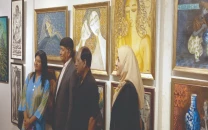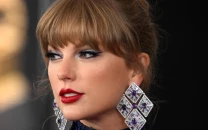In the worst of times, K-P sang along
An insight into Khyber-Pahtunkhwa’s burgeoning music industry on Music Freedom Day.

In the worst of times, K-P sang along
If you’re not from Khyber-Pakhtunkhwa (K-P) and you still know Haroon Bacha, Sardar Ali Takkar and Nazia Iqbal then clap your hands. These names may be something new to someone who isn’t from that region, but for the people residing in the purported war-torn region, they are the epitome of Pashto music. However, much to the dismay of Pashto art lovers, these stalwarts have halted their musical journey after receiving death threats from terrorists.
One still wonders how the situation got from bad to worse, and whether the contemporary musicians of K-P face the same problems or not? On the Music Freedom Day, we look at the despondency behind the moth-eaten image of K-P.
What is the Music Freedom Day?
On March 3, the annual Music Freedom Day is marked all over the world with events, seminars, exhibitions, film shows and radio programmes on the subject of freedom of expression for musicians. This time around, music forum Freemuse has gathered eight special Music Freedom Reports which offer a unique insight into current music censorship issues in countries such as West Papua, Azerbaijan and Pakistan.
‘War on Music’
Out of the eight reports shortlisted for the Music Freedom Day, a report published by Pakistani journalist Javed Aziz Khan Taliban Losing Their War on Music, has highlighted the damper that has been put on the Pakistani Pashtun music industry by the Talibans. The study reveals some intriguing facts about music shop owners who have changed their profession just to avoid harassment.
“I used to run a cassette and CD shop, but I had to change my business in 2007 when two shops in the vicinity were bombed and others were threatened that they would face the same fate if they continued,” states Gul Nawaz, a shopkeeper now selling flour in Kakshal town of Peshawar.
Similarly Mubarak Ali, a fresh fruit juice shop owner, had to face similar consequences. “I owned a CD shop in Darra Adam Khel but it was bombed in 2007. My family was petrified after that incident and I had to shift my business altogether.”
Even three musical giants Bacha, Takkar and Iqbal took drastic measures to escape the wrath of the Taliban. Iqbal has stopped singing, Bacha has sought political asylum in the US and though the case of Takkar is debatable as to why he actually left Pakistan, he now works for the Voice of America Pashto service.
Young musicians’ perspective
Despite the chaotic past, contemporary musicians of K-P aren’t scared of the consequences. “Things have improved with time. If someone wants to pick up the guitar, he or she does face criticism but not as much as they used to a few years ago,” says Zeeshan Pervaiz, the frontman of the Peshawar-based band Sajid & Zeeshan.
K-P artists believe that technology has opened new doors of expression for them. “YouTube has changed everything for us so violence against musicians doesn’t affect us anymore,” says Jawad Iqbal, a member of the band Yasir & Jawad band of K-P. “Only 30 per cent of our listeners are in K-P and the rest are from other parts of Pakistan,” he says. “The reason why we are threat-proof is because we sing about generic subjects and don’t really cover controversial topics in our songs. And also because our music is mainly promoted via the internet and there is no internet access in terrorism infested areas.”
Naseer & Shahab, a Pashto rock band, believes that things have gotten worse but the musicians have become more tenacious. “We are getting recognition on national platform which gives us motivation to make better music,” said Naseer Afridi the vocalist who comes from Khyber Agency. “Pashtuns love the music, but hate the musicians,” the singer concludes.
Published in The Express Tribune, March 3rd, 2012.



















COMMENTS
Comments are moderated and generally will be posted if they are on-topic and not abusive.
For more information, please see our Comments FAQ